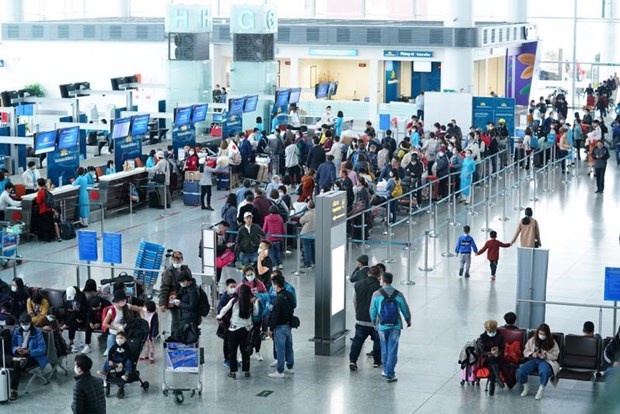INTERNATIONAL INVESTMENT
AND PORTAL
The Civil Aviation Administration of Vietnam (CAAV) has suggested reducing repatriation flights to Noi Bai and Tan Son Nhat to avoid overcrowding at rapid COVID-19 testing sites at the country’s two largest airports.
 Between January 4 and 7, a total of 47 international flights, including 16 commercial flighs, 20 repatriation flights and 11 flights for experts and tourists, carried nearly 6,100 passengers to Vietnam. (Photo: VNA)
Between January 4 and 7, a total of 47 international flights, including 16 commercial flighs, 20 repatriation flights and 11 flights for experts and tourists, carried nearly 6,100 passengers to Vietnam. (Photo: VNA)
Hanoi – The Civil Aviation Administration of Vietnam (CAAV) has suggested reducing repatriation flights to Noi Bai and Tan Son Nhat to avoid overcrowding at rapid COVID-19 testing sites at the country’s two largest airports.
The CAAV said between January 4 and 7, a total of 47 international flights, including 16 commercial flights, 20 repatriation flights and 11 flights for experts and tourists, carried nearly 6,100 passengers to Vietnam.
Of the flights, 15 with 1,285 passengers landed at the Tan Son Nhat International Airport in Ho Chi Minh City and 23 others carrying 2,950 passengers touched down at the Noi Bai International Airport in Hanoi. Three repatriation flights carrying 640 returnees landed at Tan Son Nhat and eight repatriation flights carrying 1,754 returnees landed at Noi Bai, accounting for about 50-60 percent of total air passengers on international flights.
In the past few days, to minimise congestion at the rapid COVID-19 testing sites at the two major international airports, the CAAV has closely coordinated with airlines to arrange the arrival time of international flights.
However, Vietnam faces difficulties adjusting the arrival time of regular international commercial flights, which depart from other countries and territories. Meanwhile, repatriation flights are charter ones that are operated more flexibly, especially regarding the landing airports in Vietnam.
In the past, most repatriation flights, which offer a package of air tickets, COVID-19 testing and selected quarantine accommodation for Vietnamese citizens were arranged to land at Van Don, Da Nang and Cam Ranh international airports. As a result, the combo charter flights did not affect the activities at the Noi Bai and Tan Son Nhat International Airports.
However, the two airports have seen overcrowding at the rapid COVID-19 testing areas because of increased repatriation flights and returnees.
VNA



















